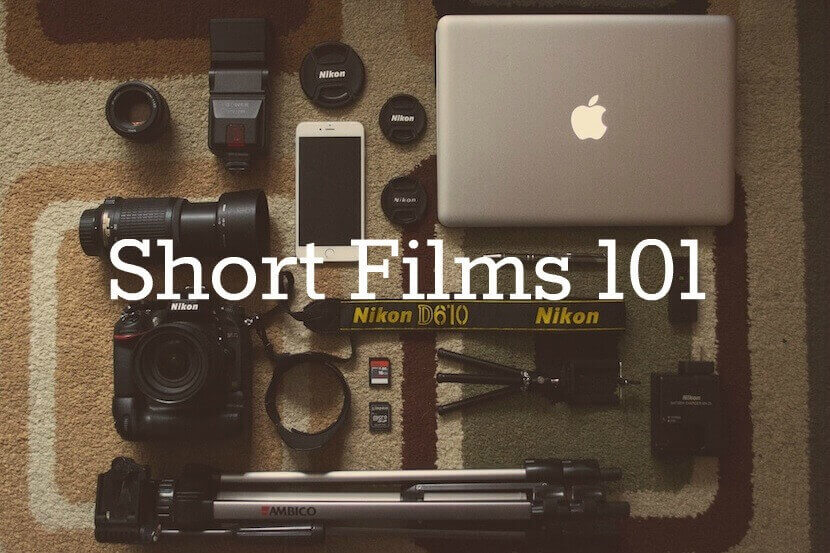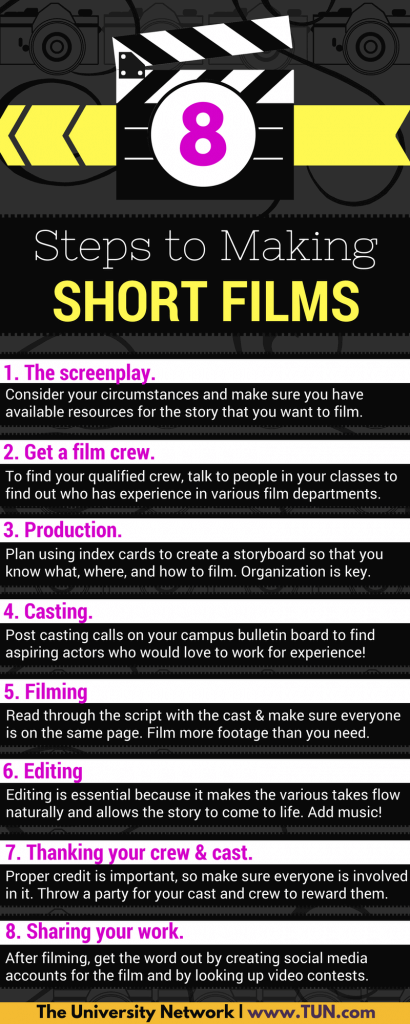Whether you’re a film student or a movie enthusiast, the thought of developing a short film has probably crossed your mind. You gotta admit it’s pretty tricky to film an award winning masterpiece when you’re still in college and can barely afford to buy yourself dinner, let alone manage a budget for a movie. You also have to deal with the endless clashing of schedules and the frustration of creative differences. So…how do people do it? How are thousands of college kids today working together to film stories that are featured in various festivals and go on to win awards?
As the screenwriter and director of my own short film, I have suffered through the trials and tribulations of assembling a team and telling my story.
Here are 8 steps to take to make your journey smoother:
1. The screenplay
Figure out what story you want to tell but consider your circumstances. See what facilities are available to you on campus and find out if there’s a media center that lets you borrow equipment. Sure, writing a screenplay about an utopian society with flying saucers would be rad but realistically, you can’t film that on a college campus. Make sure the story you want to tell can be filmed with the resources immediately available to you. Trust me, it will make production a whole lot easier.
2. Get a film crew
This step can be extremely stressful if you don’t take it seriously. As fun as having your friends on your crew may sound, there’s a good chance they’re not the most qualified. Talk to people in your classes and find out who has experience in the various filmmaking departments. Did you know that the girl that sits behind you in chemistry class actually has directed a couple of films? The dude who lives down the hall from you records his own music and would love some exposure. His roomie is a pro when it comes to lighting. You’ll never know who’s out there unless you go out and talk to people or post a formal notice on the student center’s bulletin board. “Looking for film crew – serious inquiries ONLY” is a great start.
3. Production
Now that you have your crew, it’s time to plan plan plan! Index cards are your best friend. Use them to create a storyboard that lists your scenes, locations, props, etc. This way, you’ll know WHAT to film, WHERE to film and HOW to film. Organization is key when developing a film because it helps you stay on track. No planning? Messy. Avoid it all costs.
4. Casting
Congratulations, production is all set. You know exactly how you’re going to depict your story and locations are chosen (always make sure to ask for permission if you plan on filming on private property). Now what you need is a cast. Trust me, there are PLENTY of aspiring actors on your campus who would love work (even if it’s unpaid). Having work to put on a resume is compensation enough for most people so it’s time to hit up the bulletin board again to post casting calls!
5. Filming
You have a film crew, you have a cast. Now it’s time to actually film. After you read through the script with your cast, make sure everyone is on the same page and scheduling is set. Always make sure to film more footage than you need (your editors will thank you for this) and don’t be afraid to voice your concern if things aren’t going as planned. As executive producer, you have most of the creative control. Collaborate with your director and possible other producers to reach an agreement. Be open to suggestions and artistic differences.
6. Editing
Remember that dude who lives down the hall and records music? Yeah. He’ll come in handy. Not only is editing essential because it makes the various takes flow naturally, it also allows the story to come to life. Adding music can often add depth or suspense to your scenes and lighting can be tweaked to portray different tones or moods. Also, did I mention how professional your film will look with proper editing?
7. Thanking your crew/cast
This one is pretty obvious. Since we’re all college students and not millionaires, it’s safe to say the cast and crew won’t be getting hefty paychecks for their hard work. There are plenty of other ways to thank them though: throw a pizza party. A few boxes of pizza won’t tarnish your bank account. Plus, college students love being fed. Proper credit is important too. Make sure everyone involved is in those credits!
8. Sharing your work
Now that your film is complete and the cast and crew have something to put on their resumes, it’s time to get the word out. You can create social media accounts for the film and look up video contests (such as scholarships or festivals). If you’re proud of your work, you’re going to want it to get the recognition it deserves. Do your research and good luck, you future Oscar winner!




